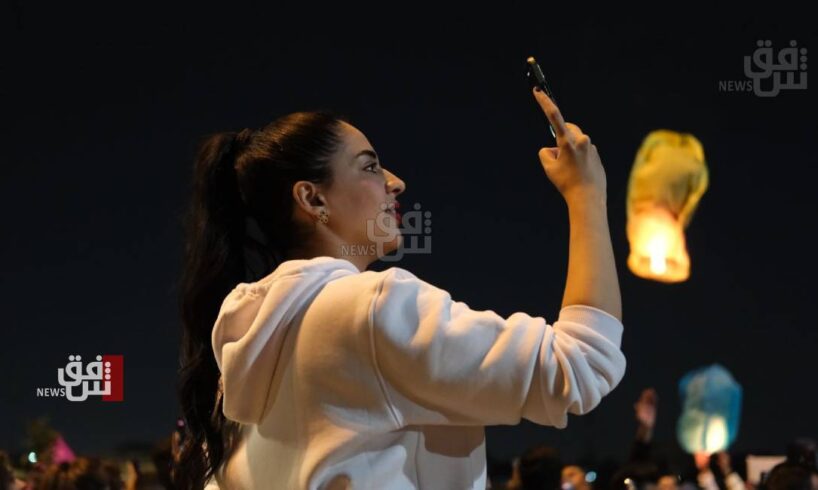
Shafaq News
Iraqi women stepping into public
life—whether as candidates, journalists, or activists—are facing a rising tide
of backlash: smear campaigns that weaponize their reputation, morality, and
perceived “honor.” With just three months until the 2025 parliamentary
elections, rights advocates warn of a coordinated push to silence and sideline
them through digital manipulation, character attacks, and sustained public
pressure.
These offensives have become faster,
louder, and harder to escape. Fueled by manipulated images, AI-generated
content, and unchecked social media outrage, they now strike in real time—often
with little legal consequence.
Morality as a Political Weapon
What once circulated as private
gossip has shifted into overt strategy. “There is a dirty campaign by some
members of society—even from within the political sphere—against strong women,”
observed Lina Ali, a media professional and women’s rights advocate, during an
interview with Shafaq News. She described these smear efforts as a new form of
exclusion—designed to restrict creativity, hinder empowerment, and suppress
women’s rights to education and work.
Ali connected the rise in attacks to
the absence of legal deterrents and, crucially, to the weakening of women’s
protections following recent amendments to Iraq’s Personal Status Law. The
changes allow Muslim couples to bypass the civil family system in favor of
rulings based on sectarian interpretation. Critics argue this shift undermines
legal equality in marriage, inheritance, and custody, reinforcing patriarchal
norms and giving social stigma—especially “honor-based” accusations—greater
weight. “The community has become intellectually devastated,” Ali added. In her
view, “true honor lies in dedication to work, honesty, integrity, and love for
the homeland.”
AI-Enhanced Smear Campaigns
Digital technology has changed the
scale and sophistication of these efforts. Ansam Salman, Director of the Isen
Organization for Human Rights, explained to Shafaq News that smear campaigns
now rely on artificial intelligence and image manipulation. “This is a
coordinated male-dominated attack aimed at pushing female candidates out of the
race,” she noted.
Salman described how falsified
narratives are circulated online in the name of morality. While social media
has provided space for youth and civil movements, it has also become fertile
ground for misinformation—enabling reputational damage to spread quickly, often
without accountability.
Double Standards
Smear campaigns often tap into
deeply rooted gender norms. Ruaa Khalaf, a human rights defender, clarified to
our agency that in patriarchal societies like Iraq, “a woman’s honor is the
most reactive point for public opinion.” That sensitivity, she noted, makes
honor-based accusations a potent tool for marginalization. “When men act
inappropriately, the public looks away. When women simply step outside the
norm, it becomes a scandal.”
Although committees were formed
after earlier elections to support female candidates, Khalaf described them as
ineffective. “They existed on paper,” she added, “but had no meaningful role.”
Former MP Rezan Sheikh Dler echoed
Khalaf’s concerns, attributing the committees’ fading relevance to the fact
that vilification is sometimes orchestrated from within the government itself
or by party leaders aiming to discredit rivals.
Political Cost: Fewer Women on the
Ballot
Shafaq News, citing the Independent
High Electoral Commission (IHEC), shows that only 37 of the 130 candidates
nominated by political parties are women. All four independents are men. Iraq’s
Electoral Law reserves 25% of the 329 parliamentary seats for women, but legal
quotas alone have not been enough to counter cultural and technological
exclusion.
A Law Without Teeth
While Iraqi law criminalizes
defamation, enforcement remains weak. Helin Hussein, a legal expert, argued to
Shafaq News that Article 433 of the Penal Code—which sets penalties ranging
from one month to one year in prison, or a fine between five and fifty
dinars—does not provide adequate protection. “Using personal dignity as a
weapon to discipline or terrorize women is a form of symbolic and social
violence,” she observed.
Hussein pointed to the case of
Zainab Jawad, a lawyer and activist from the Tishreen movement, who became the
subject of an online smear campaign after her arrest by security forces.
Known as one of the most outspoken
critics of the amendments to the Status Law, Jawad was targeted after activists
believed her phone had been accessed and private photos were deliberately
leaked. The incident triggered public outrage and was widely viewed as an
attempt to intimidate politically active women. “This is public incitement to
violence and must be criminalized both legally and morally,” Hussein added.
A Nation’s Name on Her Shoulders
In Iraq’s prevailing cultural
landscape, the concept of “honor” remains tightly bound to women’s bodies—while
other moral transgressions go largely unchecked. “Thieves, blackmailers, liars,
traitors—even murderers—escape moral condemnation,” noted Awatif Turki Rashid,
an advisor on women’s affairs, in a statement to our agency.
That issue, she warned, imposes a
heavy social and psychological toll. Rather than reflecting a shared ethical
standard, honor is treated as a personal burden—one that women are expected to
carry alone. “In Iraqi society, the concept is thorny,” she observed, “because
it burdens the woman with responsibility—not just for herself, but for her
family, her tribe, and even the reputation of the nation’s women.”
To shift this dynamic, Rashid
recommended comprehensive awareness efforts and legal accountability. In her
view, stronger penalties and full enforcement of existing laws are essential to
protect women from campaigns designed to damage reputations and silence voices
in public life.
Written and edited by Shafaq News
staff.





